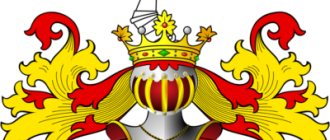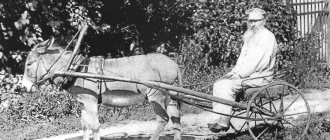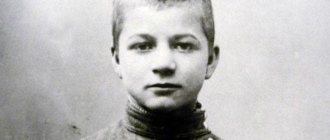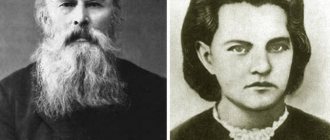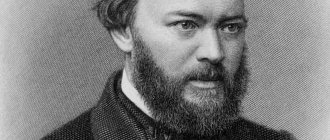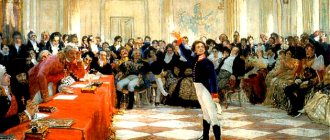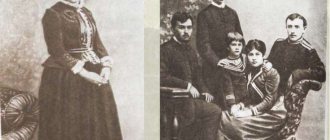⭐⭐⭐⭐⭐ Alexander Isaakievich Solzhenitsyn : childhood, youth, personal life, creativity and interesting facts.
Alexander Isaakievich Solzhenitsyn is an essayist-publicist, a famous world writer, playwright, poet and Soviet politician with dissident views.
As an outspoken opponent of communism, he created cult works that conveyed to the people the socio-political flaws of social equality. As a historian-philologist of the highest degree, Solzhenitsyn is widely known for his publications on the formation and development of Russia in the 19th-20th centuries.
Childhood and youth of Alexander Isaakievich.
On December 11, 1918, in Kislovodsk, Taisiya Zakharovna Solzhenitsyna (nee Shcherbak) gave birth to a boy who was named Sasha. Six months before the birth of her son, the young mother was widowed - the father of the future writer tragically died while hunting.
Taisiya Zakharovna, Alexander’s mother, comes from a Kuban family of landowners. The writer's father, Isaac Semenovich, came from North Caucasian peasants. They met in Moscow, where a young Ukrainian woman, Taisiya, came to study, and the brave junior officer of the Grenadier Artillery Brigade, Isaac, received a two-week vacation to visit his classmates.
The revolutionary events of 1917 and the subsequent civil war (until 1922) ruined the Shcherbak-Solzhenitsyn family. In 1924 they moved to Rostov-on-Don, where Sasha studied at a local school. It was the educational period that discovered his writing talent - in the period 1929-1934 he created his first poems and essays. From the age of 9, little Sasha firmly decided to become a writer.
Having finished school with excellent marks in 1936, Alexander entered Rostov State University to study physics and mathematics. In 1939, Solzhenitsyn was still studying at the correspondence department of the literary faculty of the Moscow Institute. He did not have time to receive a literary education; the war began.
The Second World War
Despite his poor health, Solzhenitsyn strove to go to the front. Since 1941, the writer served in the 74th transport and horse-drawn battalion. In 1942, Alexander Isaevich was sent to the Kostroma Military School, after which he received the rank of lieutenant. Since 1943, Solzhenitsyn has served as commander of a sound reconnaissance battery. For military services, Alexander Isaevich was awarded two honorary orders, received the rank of senior lieutenant, and then captain. During this period, Solzhenitsyn did not stop writing and kept a diary.
Conflict with authorities.
In February 1953, the writer served exile in Kazakhstan and treated metastases in Tashkent.
In 1956, Solzhenitsyn was rehabilitated for “lack of evidence of a crime.” In 1967, the KGB seized Solzhenitsyn's archive and banned publication.
In response, Alexander Isaakievich sends a letter to the Congress of Soviet Writers about the inadmissibility of censorship and persecution by the authorities. During the liberalization period of 1968, this paper shook up the entire foreign elite, and the Soviet authorities looked at him as an enemy of the people.
Under the powerful patronage of influential delegates, from the pen of the master comes the continuation of the cult bestseller “The Gulag Archipelago,” a story about the life of people in colonies and exile settlements.
1968 - foreign samizdat publishes “Cancer Ward” and “In the First Circle”, the book of the novel about exiled prisoners “An Experience in Artistic Research” is almost completed. In 1974 , after the resonant release of the first volume, the KGB confiscated the manuscripts as propaganda, and the author himself was deported from Russia.
He is forced to travel around the CIS countries in search of fresh creative ideas without the right to visit his homeland.
The formation of Solzhenitsyn as a realist writer
All this time he continued to write. Solzhenitsyn’s development as a writer took place while still in exile, in the Kazakh steppes. Having gained personal experience of camp life, he wrote a truly masterpiece: the novel “One Day in the Life of Ivan Denisovich,” which became his “calling card.”
The story of a simple prisoner, camp morals, lawlessness and cruelty of the prison authorities - all this was vividly and originally reflected in the work.
The time has come to mention the following event, which greatly influenced Solzhenitsyn’s entire subsequent life. Through mutual friends, having previously removed the most provocative passages from the novel, he submits his work for review and immediately becomes a famous writer from an unknown author. A. Tvardovsky, having read the novel, appreciated the work very highly and began to push for its publication.
Soon the incredible happened: the novel fell into the hands of Khrushchev himself and he ordered permission to publish it.
On December 30, 1962, Solzhenitsyn was already admitted to the Union of Writers of the USSR. His other works, “Matryoshin Dvor” and “The Incident at Kochetovka Station,” are consistently presented to readers. The stories received a huge response from readers, especially from former prisoners (these materials formed the basis for work on another great novel about Stalin's tyranny).
Solzhenitsyn's works were very different in the manner of presentation; they were characterized by originality and civic courage.
When mentioning Khrushchev’s personal order to publish the scandalous novel, it is necessary to mention the personal interest of the then “reformer” in this: Khrushchev himself exposed Stalin’s crimes, and the novel, describing the events of that terrible time, helped in the ideological struggle.
At the same time, these works are translated into other languages and published in Frankfurt in October 1964. Abroad, Solzhenitsyn’s original works also do not go unnoticed and become widespread.
The works of Alexander Isaakievich Solzhenitsyn.
Solzhenitsyn's writing activity belongs to the “post-Soviet return” - literature that is available to the ordinary reader after the abolition of censorship.
His works are characterized by the following features:
- The author’s formed worldview and personal experience include participation in the Great Patriotic War, life in camps, exile in Siberia, forced emigration from his native country.
- Harsh criticism of the totalitarianism of the USSR.
- Thematic polemics of Stalinism.
1948-53 - national fame comes to the writer after the publication of “The New World” with his works.
- “One Day in the Life of Ivan Denisovich” (1961) is a description of the life of a peasant imprisoned in the Gulag.
- “Matrenin’s Dvor” (1963) is an objective look at the heroine’s life as a holy great martyr.
The main characters of the essays are ordinary people, depicted as spiritual connoisseurs of shrines, exploring the world order of universal human values. The works caused a public outcry, and the first letters from grateful readers were from former Gulag prisoners. It was precisely the sharp separation of Solzhenitsyn’s work by civic courage from the literature of that time that founded the “GULAG Archipelago”.
Life abroad. Last years
From 1975 to 1994, the writer visited Germany, Switzerland, the USA, Canada, France, Great Britain, and Spain. In 1989, “The Gulag Archipelago” was first published in Russia in the magazine “New World”, and soon the story “Matrenin’s Dvor” was published in the magazine.
In 1994, Alexander Isaevich returned to Russia. The writer continues to be actively involved in literary activities. In 2006–2007, the first books of the 30-volume collected works of Solzhenitsyn were published.
The date when the difficult life of the great writer ended was August 3, 2008. Solzhenitsyn died at his home in Troitse-Lykovo from heart failure. The writer was buried in the necropolis of the Donskoy Monastery.
Personal life of Solzhenitsyn.
There were two loves in the life of Alexander Isaakievich. In 1940, he married Natalya Reshetovskaya, a graduate student in chemistry at the University of Rostov. Later, in memory of her famous husband, she will write memoirs - “In a Dispute with Time” (1975), “Excommunication” (1994) and the book “In the Second Circle: Revelation of Solzhenitsyn’s First Wife” (2006).
In the summer of 1968, Solzhenitsyn met MSU graduate student Natalya Svetlova, who quickly became his secretary and good friend. Watching their romance from the side, Reshetovskaya tries to poison herself, but is saved. 1972 - Solzhenitsyn struggles to get a divorce.
From his marriage to Svetlova, the writer has three children who inherited their father’s literary talent.
Brief biography of Solzhenitsyn
Alexander Isaevich Solzhenitsyn
Alexander Isaevich Solzhenitsyn was born on December 11, 1918 in Kislovodsk. He is a great writer, academician of the Russian Academy of Sciences, political figure and social activist, famous historian, dissident, Nobel laureate.
The father is a working peasant, and the mother is a Cossack woman. A poor family moved to Rostov-on-Don in 1924 because of a hard life.
Alexander's education begins in 1926, when he is sent to a local school. It is this early age that marks the beginning of his development as a writer - at school he creates his debut poems and essays.
Ten years later, in 1936, Alexander continued his studies, entering the university in Rostov at the Faculty of Physics and Mathematics, but without giving up his active literary work. After graduating from the university in 1941 and receiving a diploma with honors, Alexander Isaevich decides not to finish his education. In 1939, he submitted documents to the Institute of Philosophy in Moscow, Faculty of Literature and History, but due to the outbreak of hostilities, Alexander was unable to receive a diploma from this institute.
During the war, Alexander really wanted to go to the front, and, not paying attention to his poor health, in 1941 he entered service in the transport and horse-drawn sector. The Kostroma Military School greets the writer in 1942, where Alexander receives the rank of lieutenant. Already in 1943, the writer served as commander of sound reconnaissance. Alexander's merits during the war years were so noticeable that for them he received two honorary orders and the main rank for him - senior lieutenant, and after that - captain.
Stalin's policies were alien to Alexander, which is why in 1945 he was convicted and sent to an eight-year stay in a camp and lifelong exile. In the winter of 1952, doctors gave Alexander an incurable diagnosis - cancer.
Alexander Solzhenitsyn was married twice, and both times to girls named Natalya. The first wife was Natalya Reshetovskaya, and the second was Natalya Svetlova. From his marriage to Natalya Svetlova, the writer Alexander left three sons, not deprived of talents and gifts - Stepan, Ignat, and Ermolai Solzhenitsyn.
It is also impossible to hide the fact that during his lifetime Alexander Isaevich was awarded more than twenty honorary awards, as well as the Nobel Prize, which he was awarded for his work “The Gulag Archipelago.”
In literary circles, he is often spoken of as Tolstoy or Dostoevsky, but in his own era.
From 1975 until 1994, Alexander managed to visit Germany, Spain, Switzerland, Great Britain, the USA, France and Canada.
And already in 1994, the writer returned to his homeland, where he continued his literary activity. The first thirty volumes of the collected works of Alexander Solzhenitsyn were published in the period 2006-2007.
Alexander Isaevich Solzhenitsyn died on August 3, 2008 in Moscow. The writer's funeral took place at the Donskoy Monastery in the necropolis.
A stone cross stands on the grave of Alexander, which was created according to the design publication of the famous sculptor Shakhovsky.
Interesting facts about the writer:
In the biography of the outstanding historian A.I. Solzhenitsyn has many interesting facts.
- due to health reasons, the writer was considered limited in mobilization, but managed to be sent to the front line, where he was awarded the Order for courage;
- Alexander Isaakievich carefully took notes on military events, which was prohibited at that time;
- the reason for the writer’s arrest was his personal ideas sent to friends on paper;
- after three years of living in the Gulag, Solzhenitsyn learns about a fictitious divorce from his first wife Natalya Reshetovskaya, after a while they marry again;
- after his release a year later he was rehabilitated (1956);
- after exile, Solzhenitsyn works as a teacher in the village;
- Alexander publishes his first stories under the patronage of N.S. Khrushchev;
- in December 2014, his museum was opened in Kislovodsk.
The work of A. I. Solzhenitsyn is imbued with anger for the mistakes of the Stalinist party. The freedom-loving writer based his works on the moral potential of the revolutionary ideas of that time.
Author and history
The historical process in the life of Alexander Isaevich played a big role. However, like the personality of the writer in the historical process. The phenomenon of Solzhenitsyn’s creativity is that he does not simply describe certain historical facts in his works. It is important that the books reflect everything that people really experienced during that time period. If the author talks about a revolution, he does not simply state a fact, but tries to understand the reasons for actions and predict what this may lead to in the future.
This is interesting! Anna Akhmatova: creativity and biography briefly
If we talk about war, Solzhenitsyn knows about it firsthand. He fought himself, rose to the rank of captain, smelled gunpowder, so to speak. And the author speaks clearly and simply about life there, behind the perimeter, surrounded by barbed wire, and does not invent or embellish anything.
To summarize, I would like to note that Solzhenitsyn’s personality is probably the most noticeable in literature and in the history of the second half of the twentieth century. These texts need not just be read, but passed through your own soul and heart.
Perestroika and gradual legalization of the scandalous author
The changes that came with perestroika and glasnost in the USSR also affected literary activity: many of his works were published in the author’s homeland. Having analyzed the real state of affairs in the country, he published a lengthy article about the life of the state and the people. It became a collective of all previously published journalistic works and received a wide positive response. A year before the collapse of the USSR, analyzing political sentiments and current trends, he was able to predict and warn about dangerous interethnic tensions that would have tragic consequences. He paid special attention to separatist sentiments and their danger. He raised questions about the legality of borders and the fate of republics striving for independence.
His prophecies were fulfilled exactly: the huge USSR collapsed, communist ideology was rejected.
The result of recognition of his merits was the restoration of citizenship in 1990.
